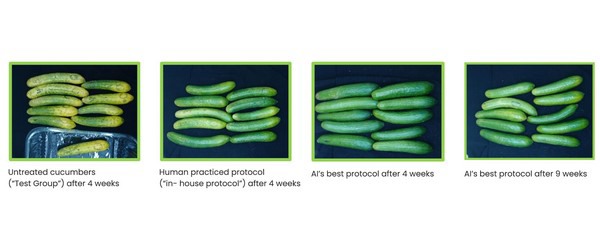The MIGAL Galilee Research Institute (MIGAL), a regional mega-R&D center supported by Israel's Ministry of Science and Technology, announced that its researchers have more than quadrupled the postharvest life of cucumbers - from two to nine weeks - using a "smart" sequential treatment protocol suggested by its innovative AI-based algorithms.
The study, "Algorithmically-guided postharvest protocols by experimental combinatorial optimization," was carried out over 18 months by MIGAL's Postharvest Innovation Center under the leadership of Prof. Ofer Shir, an Associate Professor of Computer Science at MIGAL and Tel-Hai College, and Dr. Dan Gamrasni, Postharvest Research Associate at MIGAL and Tel-Hai College.

"It remains shocking to know that a full third of the produce grown today continues to be wasted, even as farmers intensify their struggle to increase yields in the face of climate change and urbanization," commented Dr. Gamrasni. "The aim of our research is to help reduce waste across the global food supply chain while enhancing the efficiency of existing agricultural processes and resources."
Prof. Shir continued, "In launching this project, we hypothesized that a 'smart', algorithmically-guided combination and sequencing of existing produce treatments could multiply their preservation effect, significantly extending fruit and vegetable shelf-life after harvest. However, the results we achieved were much better than we had expected: our protocols more than quadrupled the shelf-life of cucumbers, keeping them fresh for a full nine weeks."
The MIGAL team's algorithms used an AI system to investigate the combinatorial search space of postharvest cucumber treatment models, learning the fruit's response to variations in timings, ordering, and activation levels of certain operations. At the end of the process, a single multi-stage treatment protocol was selected for testing in MIGAL's fields and laboratories.
Sensitive fruit
The product selected for the experiment was the cucumber, a sensitive fruit with a high wastage rate due to its average postharvest storage lifespan of less than two weeks. Immediately after harvest, the fresh cucumbers were transported to the laboratory, weighed, treated using the protocol suggested by the AI system, and stored for four weeks in accordance with the AI protocol. At the end of this period, it was determined that the fruit's weight, color, crispness, and other qualities had undergone minimal change, and the cucumbers were stored again for an additional five weeks. The final evaluation demonstrated a continued marketable level of quality.
Prof. Shir continued, "These results confirmed that 'smart' sequencing of multiple treatments can dramatically extend produce shelf life as compared with the protocols in use today. We know of no other project that has been able to extend produce postharvest shelf life by such an extent – and are eager to share our knowledge."
Encouraged by these results, MIGAL researchers have now begun investigating the development of AI-based algorithms and multi-stage protocols for other agricultural use cases, even at the growing stages. One area under consideration is the optimization of the complex treatment protocols used for vertical farming, a new field in which farmers grow produce intensively in controlled environments. MIGAL researchers hypothesize that these AI-based algorithms will enable the optimization of protocols in other combinatorial search spaces – for instance, with variations of lighting, gasses, temperature, fertilization methodologies, water temperatures, and other resources – with the aim to reduce production costs while increasing yields.
Achieving nutritional security
Prof. Dan Levanon, MIGAL's Scientific Director and Research Group Leader commented, "The research being carried out by Prof. Shir and Dr. Gamrasni is an important step forward towards solving one of the modern world's most significant challenges: nutritional security. As our population expands, the quantity of arable land and water continues to shrink – and then more than a third of the produce grown is wasted. MIGAL's innovative use of AI will bring to light new protocols that will increase production, minimize costs and reduce waste. This is an extremely important development whose impact will be felt throughout agriculture."
Hila Haddad Chmelnik, Director General of Israel's Ministry of Innovation, Science, and Technology, added, "This is a significant scientific achievement for the MIGAL Research Institute that will benefit populations around the globe. The entire process is an outstanding example of the value of our ministry's R&D institutes, which help develop latent scientific talent and resources outside of our nation's urban centers. We are proud of the technological breakthroughs that continue to arise from these vibrant centers, extending Israel's leadership in the Foodtech and Agritech industries."
This research project has been supported by Israel's Ministry of Innovation, Science and Technology from its general grant to the MIGAL Research Institute and from postdoctoral financing allocated to this subject. Recently, the researchers received an additional grant from Israel's Office of Agriculture to extend and accelerate the research.
For more information:
MIGAL Galilee Research Institute
Yael Shavit
[email protected]
www.migal.org.il
